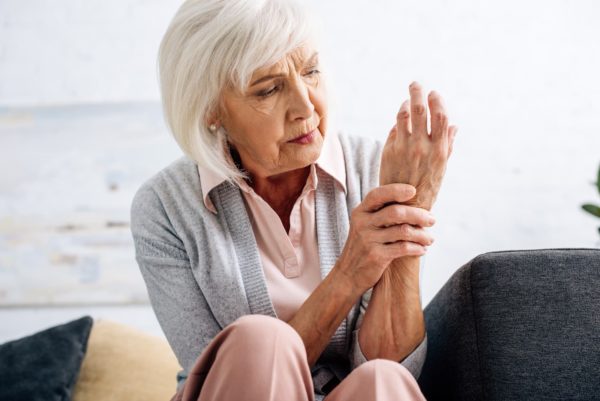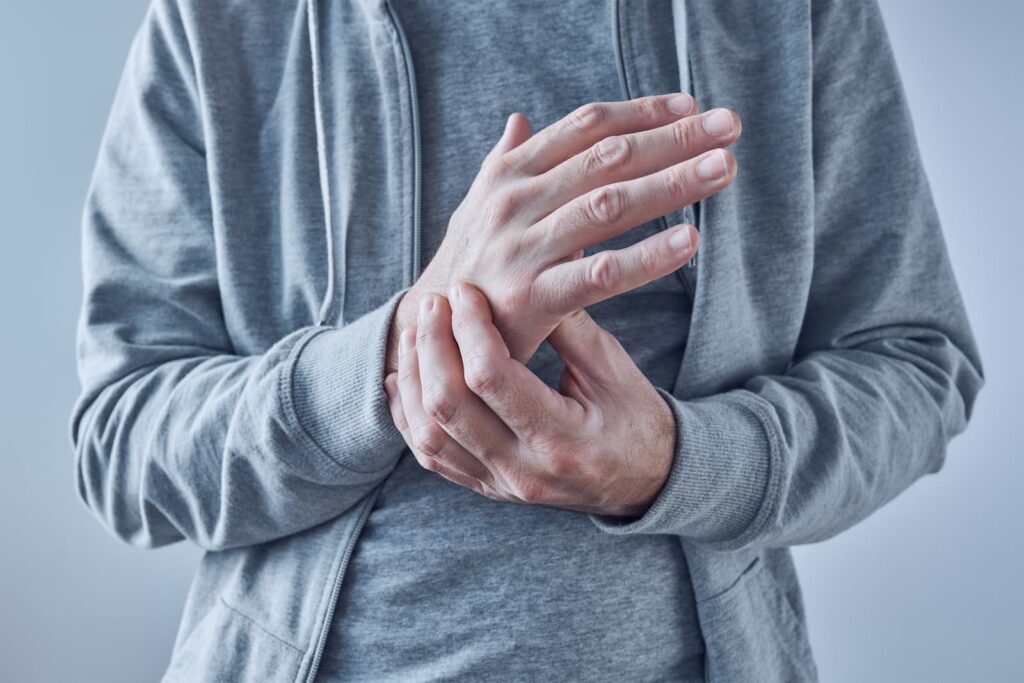
Arthritis Definition
Arthritis is a condition of pain and inflammation in one or more joints. Arthritis and other common joint problems affect more than 10 million people in the UK.
What are the different types of arthritis?
There are different types of arthritis, the main being osteoarthritis and rheumatoid arthritis. You may have also heard of psoriatic arthritis, gout, and lupus, which are also recognised as types of arthritis
What is the difference between osteoarthritis and rheumatoid arthritis?
The main difference between osteoarthritis and rheumatoid arthritis is that osteoarthritis involves the physical wearing away of the joint cartilage, whereas rheumatoid arthritis is an inflammatory disease that attacks the joints and surrounding tissue. Rheumatoid arthritis typically affects individuals at a younger age, but not always. Osteoarthritis tends to affect large joints, particularly knees and hips. Rheumatoid arthritis typically affects multiple joints at the same time and is often symmetrical (affecting the same joints on each side of the body).
What Causes Arthritis?
The most common cause of arthritis is osteoarthritis, which is a disorder whereby there is structural change within a joint due to abnormal repair in the setting of injury and/or increasing age. It is the most common joint disease globally. It is estimated to affect almost 9 million people in the UK.
The next most common arthritis is rheumatoid arthritis which is a systemic inflammatory disease, which typically affects the small joints of the hands and feet in a symmetrical fashion, although it may affect any joint. In addition to pain and swelling, it classically results in early morning stiffness. In addition to its effects on the joints it can also affect other bodily systems such as the eyes, lungs or heart.
Other causes of arthritis include:
- Ankylosing spondylitis
- Cervical spondylosis
- Systemic lupus erythematosus
- Gout
- Psoriatic arthritis
- Enteropathic arthritis, associated with inflammatory bowel disease.
- Reactive arthritis
What causes osteoarthritis?
The most common cause of arthritis is osteoarthritis, which is a disorder whereby there is structural change within a joint due to abnormal repair in the setting of injury and/or increasing age. It is the most common joint disease globally. It is estimated to affect almost 9 million people in the UK.
What causes arthritis to flare up?
Arthritis flare ups are usually caused by over-use of the arthritic joints. But there may be some other triggers such as inconsistency with your treatment plan, stress or lack of sleep. This differs from person to person and it’s important to make note of what you think might have caused your flare up to understand the cause.
Arthritis Symptoms
The symptoms associated with arthritis will depend on the underlying cause for the pain. The pain may be mild or severe and continuous or sporadic.

Many types of arthritis are associated with reduced range of movement of affected body structures resulting in limited function and restriction in activities.
The most common pain locations are back, hips and knees. However, the way the specific sites and the way they are affected may suggest the underlying cause of arthritis. Therefore, it is always important to seek a diagnosis where possible through a trained healthcare professional.
Arthritis is not only a physical problem; it often has severe effects on psychological, social and economic health.
What are the main signs of arthritis?
The main signs of arthritis are:
- Stiff or tender joints
- Inflamed joints and redness around the joints
- Restricted movement
- Weakness and muscle loss
What are the symptoms of rheumatoid arthritis?
Rheumatoid arthritis symptoms are vast, and it is important to note that some of these symptoms will help medical professionals differentiate the type of arthritis that you are suffering from. The main symptoms are:
- Pain and swelling in joints, that is often symmetrical and warm to the touch
- Pain in fingers and toes that spreads to other joints
- Red and discoloured joints
- Tingling or numbness in the hands and feet
Below is a list of symptoms that may also affect individuals with rheumatoid arthritis:
- Disrupted sleep and fatigue
- Depression and mood changes
- Weight loss
- Dry mouth and eyes
What are the symptoms of osteoarthritis?
The main symptoms of osteoarthritis are:
- Tender joints that have limited movement
- Stiffness and pain when moving joints
- A crackling or grating noise or sensation
- Loss of muscle bulk
- Swollen joints
Arthritis Conditions
A holistic approach is often needed to treat chronic arthritis. Physiotherapy, modifications to work and home environment and psychological therapies are important aspects of patient care. It is also important to try and continue exercising as tolerated.
Medical therapy is dependent on the underlying cause of arthritis, as addressing the underlying cause is an important component of treatment.
For arthritis, simple painkillers are often first line treatment with stronger painkillers used in conjunction in severe pain. For those with inflammatory arthritis they may be started on specialist medications that regulate their immune system.
For those with osteoarthritis of the hip or knees, they may benefit from an operation when severe.
Medicinal cannabis can be considered when first line therapies have not achieved adequate symptom control for their pain. There is insufficient evidence to suggest whether medicinal cannabis may affect disease progression.
How is Arthritis Diagnosed?
Arthritis is usually diagnosed by taking a thorough history and examination to identify the type of pain, severity, functional impact, and context.
Blood tests are often usual when assessing whether the arthritis is part of a systemic inflammatory condition.
Some patients may benefit from X-Rays, ultrasound scans or MRI scans of the affected areas, depending on the symptoms described by the affected individual.
A clinician may make recommendations for other investigations, such as joint aspiration, depending on the underlying cause of the arthritis.
Arthritis Treatment
There is no cure for arthritis, but there are many ways in which arthritis can be treated. A holistic approach is often needed to treat chronic arthritis. Physiotherapy, modifications to work and home environment and psychological therapies are important aspects of patient care. It is also important to try and continue exercising as tolerated.
Medical therapy is dependent on the underlying cause of arthritis, as addressing the underlying cause is an important component of treatment.
Pain relief for arthritis
 Managing the pain that arthritis causes is a crucial part of your treatment plan. For arthritis, simple painkillers are often first line treatment with stronger painkillers used in conjunction in severe pain. For those with inflammatory arthritis they may be started on specialist medications that regulate their immune system.
Managing the pain that arthritis causes is a crucial part of your treatment plan. For arthritis, simple painkillers are often first line treatment with stronger painkillers used in conjunction in severe pain. For those with inflammatory arthritis they may be started on specialist medications that regulate their immune system.
For those with osteoarthritis of the hip or knees, they may benefit from an operation when severe.
For arthritis pain relief, medicinal cannabis can be considered when first line therapies have not achieved adequate symptom control for the pain. There is insufficient evidence to suggest whether medicinal cannabis may affect disease progression.
Rheumatoid arthritis treatment
Treatment for rheumatoid arthritis can differ from other types of arthritis due to it being an inflammatory, auto-immune disease. The most common first line of treatment is a course of a disease-modifying antirheumatic drug (DMARDs). They can sometimes be prescribed alongside steroids to help reduce the pain and delay progression of the disease.
There are of course holistic approaches that can be used to help manage rheumatoid arthritis pain, like those suggested above (e.g. pain killers or medicinal cannabis).
Arrange an Appointment
If you are a patient or carer seeking an appointment to discuss medical cannabis, you can complete this form and we can assist you with this.
Eligible patients can provide us with their healthcare records or we can obtain these through your GP. This is to confirm that a patient’s condition has been fully assessed and all other treatment options have been attempted. We will ensure that the primary care provider receives all treatment communication to maintain the highest level of clinical governance.
We also accept referrals from healthcare professionals.
To refer a patient to us, please click here to fill and securely submit a referral form.
Arthritis and Medicinal Cannabis
Research into the effect of medicinal cannabis on pain associated with arthritis is limited. However, following the legalisation of cannabis for medical purposes in 2018, there has been a rise in people looking towards medical cannabis. When first-line therapies have not proved effective at reducing symptoms, medical cannabis may be considered an option for arthritis.
For further information and to find out more about medical cannabis, click here to discover more about our multi-award-winning Curaleaf Access Scheme. Alternatively, complete an eligibility assessment now. Once complete, one of our clinicians will review your application and advise whether you are eligible for progression to an appointment.

